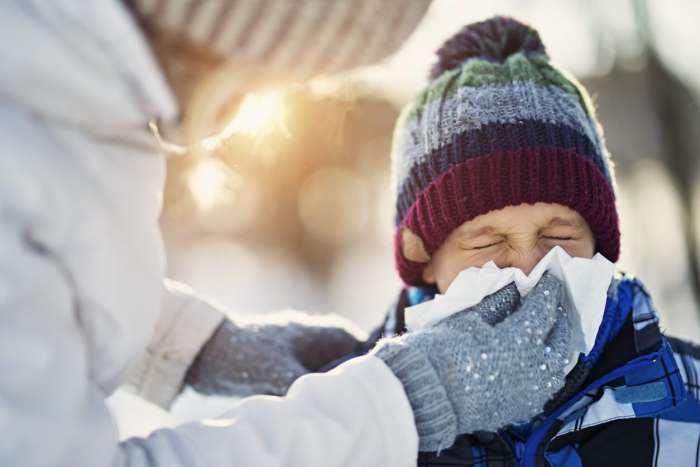Oh, no! We have just entered the winter flu season, and scientists predict it will be a long one this year. According to the U.S. Food and Drug Administration (FDA), the flu can cause serious complications and be life-threatening.
However, the COVID-19 pandemic has made it more difficult to tell if your child has the flu, COVID, or another respiratory illness like the recent Respiratory Syncytial Virus (RSV) which is also seeing an outbreak of cases.
It is important to recognize the symptoms of the flu and know when your child needs medical intervention. However, knowing your child’s symptoms will help you differentiate and find the right treatment faster
Related: Cold and Flu Season: Are You Feeding Your Kids Right?
Keep reading, if you are hoping to avoid the flu this season.
What to Know for the 2022-2023 Flu Season

The flu vaccine composition is always changing because the flu virus changes annually. Flu season usually begins in October, but may slightly vary from year to year. According to Health Hive, many people tested positive for the influenza virus last week, marking the beginning of the 2022-2023 influenza season.
Should You Let Kids Pick Out Their Own Clothes?
Have you ever been excited about an adorable romper, or a dapper little hat only to have your child reject them all and embrace a dark goth wardrobe or rainbow tutu dress instead? Read More
Scientists expect the 2022-2023 winter flu season to extend to June 2023 because of the increase in people who are infected with the flu. Therefore, it is important to take precautions to help prevent the spread of the flu and other respiratory viruses.
The best method to stop the spread of the flu is by getting vaccinated. This year, you can get the influenza vaccine at health centers or pharmacies like Walgreens. Your child can get a flu vaccine at a pediatrician’s office or a pharmacy.
What Are the Symptoms of the Flu?
The flu is a very contagious virus that causes an infection in the nose, throat, and lungs. Flu Symptoms usually begin from 1 to 4 days after being exposed to the flu virus, and they peak 3 days after the onset of the symptoms. Common flu symptoms include:
- Sudden fever and chills
- Headache
- General body aches
- Sneezing
- Coughing
- Sore throat
- Stuffy or runny nose
- Fatigue
- Nausea and vomiting
Usually, healthy children recover from the flu at home without the need for medical intervention. You should encourage your child to drink fluids and rest until he/she recovers. You can encourage your child to stay in bed by offering them fun things like toys and games.

If your child has a cough or is congested, you can place a humidifier in his/her room or give him/her a tablespoon of honey before sleeping. However, young children under 12 months should not be given honey.
It could cause severe complications. Finally, you can reduce your child’s fever by giving over-the-counter fever reducers, but always talk to a doctor before giving medication to your child.
Unfortunately, the flu can cause severe symptoms. Some children with weak immune systems or medical conditions like heart disease are at higher risk to develop flu complications or serious illnesses like pneumonia.
If your child shows serious symptoms, you should take them to the emergency room. Some severe flu symptoms to look for include:
- Difficulty breathing
- Fever over 103°F
- Severe vomiting
- Dehydration
- Ribs that pull in with each breath
- Change in skin color
- Worsened Cough
- Confusion
- Not responding
- Won’t wake up
What Are Some Ways to Avoid Catching the Winter Flu?

The best way to tackle the influenza virus is by preventing it in the first place. Learning healthy habits can help your child avoid catching the flu and many other viruses. Some things children can do to prevent catching the flu from school or at home include:
- Clean hands frequently with hand sanitizer or water and soap.
- Avoid close contact with others who are sick.
- Avoid touching the eyes and mouth.
- Do not share food with others.
Unfortunately, your child can still get infected even when taking these precautions. If you suspect that your child may have come into contact with the virus, you can give them antiviral drugs to help fight it.
They will experience milder symptoms of the flu with these medications. Many antiviral drugs like Tamiflu are now allowed to be taken by children. Unfortunately, these drugs can not be found over the counter. You must contact your child’s doctor to get a prescription.
What is the Difference Between the Common Cold, RSV, the Flu, and COVID-19?

Parents need to know the difference between the common cold, RSV, the flu, and COVID-19 to take the correct course of action if their children get infected with any of these viral infections. The best way to know what illness your child has is by learning the symptoms of each virus.
The Common Cold
Common cold symptoms are very mild like a runny nose, sore throat, and low-grade fever. Usually, an infected person is not very contagious, and by taking health precautions, you can avoid the common cold. Most children get about four colds per year. There is no vaccine for this illness but many cold medicines for kids are available at your local pharmacy.
RSV
RSV, Respiratory Syncytial Virus, is a very contagious virus. Infants are at high risk of severe respiratory disease if they come into contact with this viral infection. Some symptoms include wheezing, runny nose, sneezing, and fever.
According to the CDC, and Centers for Disease Control and Prevention, some children infected with RSV may have trouble breathing and require oxygen. If you are concerned about your child’s symptoms, contact a doctor. There is no RSV vaccine, but scientists are in the process of creating one.
The Flu
The influenza virus is contagious. Kids’ flu symptoms include high-grade fever, sore throat, runny nose, congestion, nausea, vomiting, tiredness, ear infections, and muscle aches.
Your child should get the influenza vaccine every year to help combat the virus since it could be fatal. Children under two years old or with medical conditions who are infected with the influenza virus are at higher risk of developing severe symptoms.
Coronavirus

The Sars-Cov-2 virus is highly contagious. Coronavirus symptoms include loss of smell and taste in addition to the symptoms of the flu. However, children usually have mild symptoms. Children may develop Multisystem Inflammatory Syndrome, a condition in which body organs become inflamed, but it is rare.
It is important to know that children who are infected with COVID are contagious whether they have symptoms or not. This makes it harder to prevent the spread of this virus. However, luckily, COVID-19 vaccines are now available.
How Old Should a Child Be to Get the Flu Vaccine for Kids?
According to the CDC, children over 6 months old should get the flu shot annually. It is recommended to get the vaccine before the beginning of the flu season (September or October).
Today, you have the option of getting the flu shot or the nasal spray flu vaccine. Both work well. The nasal spray vaccine can only be given to children older than two-years-old. Some side effects of the flu shot and the nasal spray include headaches, muscle aches, and congestion.

If your child has had an allergic reaction to the flu shot in the past, you should not assume that your child should no longer get the vaccine. You should contact a doctor. The flu shot has many benefits, and your child’s doctor can help you decide whether your child should still get it.
How Long Before the Flu is No Longer Contagious?
Knowing when to keep your child at home will help prevent the virus from spreading. Children are usually contagious for seven days when infected with the flu virus. They are highly infectious when they have a high-grade fever. If your child is showing symptoms or has a fever over 100°F, he/she should stay home from school and daycare.

According to the CDC, you should keep your child home until they are fever-free for at least 24 hrs without the help of fever-reducers. Children could still be mildly contagious after 24 hrs of being fever-free, but they can simply cover their mouths and nose when sneezing or coughing to prevent others from catching it.
In Conclusion
Flu vaccines for kids are now available in many places. By getting vaccinated, your child will have milder symptoms and be at a lower risk of developing life-threatening symptoms. You should also teach your child the importance of washing hands frequently at school and in all public areas.
If your child does get sick, you should keep them home until they are symptom-free to help stop the spread of the virus.



